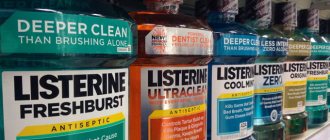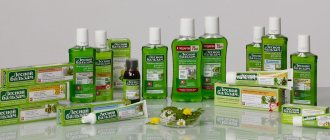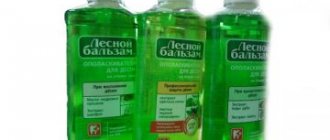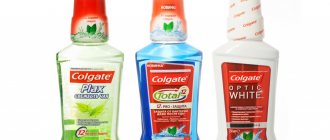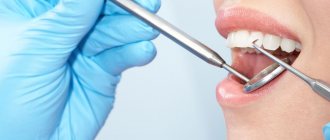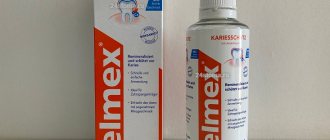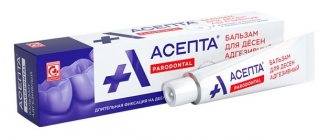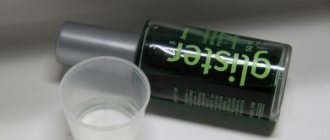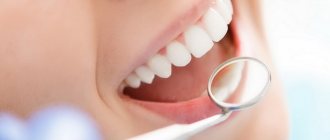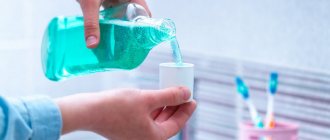Today, pharmacies and supermarkets are literally overflowing with various oral care products. There is a great variety of toothpastes, gum gels, flosses and other products on the shelves. One of the consistently popular products in this category is mouthwash.
Most dentists are confident that to prevent caries and other dental problems, it is enough to simply follow the rules of brushing - use toothpaste at least 2 times a day and carefully remove food debris with a special floss. Ordinary citizens usually use rinses more to eliminate bad breath or to prevent gum inflammation.
Whether it is necessary to buy a mouthwash or whether you can do without it is an ambiguous question, to which we will try to find an answer in the framework of this article.
What types of rinses are there?
A huge number of rinses that we see on the market can be classified into:
- hygienic - they have a rather cosmetic effect and are designed to eliminate bad breath;
- medicinal – these products already serve to eliminate certain dental diseases.
As for medicinal rinses, they are divided into the following types, depending on functionality:
- Against plaque and to prevent the development of gingivitis. These compounds can slow down the growth of bacteria in the oral cavity. They consist of antiseptics such as chlorhexidine and triclosan.
- Against the occurrence of caries. They contain increased fluoride content, which strengthens teeth and prevents caries from developing.
- Against the formation of tartar. Mouthwashes in this category contain calcium citrate and prevent the accumulation of hard dental plaque.
Pros of using Listerine mouthwash
Stay up to date! The advantages of using this rinse aid are:
- The effectiveness of the product against different types of bacteria.
- No harmful substances in the composition.
- Painless removal of dental plaque.
- Possibility of use in childhood.
- Many varieties of Listerine brand products.
The only disadvantages allergic reactions , but they are extremely rare.
What are the benefits of mouthwashes?
Of course, not a single product of this type can protect 100% from dental or periodontal diseases. However, they do a good job of fighting bacteria and freshening your breath. Thanks to herbal extracts, many of them quickly relieve gum inflammation.
Other benefits of using mouth rinses include:
- These are 100% ready-to-use solutions that are ideal for express care of teeth and gums.
- As a rule, rinses have a rather pleasant smell and taste, which creates a certain comfort when using them.
- Such products have a deodorizing effect, allowing you to maintain fresh breath almost all day long. Fragrances are usually mint or menthol.
- Therapeutic and prophylactic agents are characterized by anti-caries, anti-inflammatory and disinfectant effects. They can also significantly reduce tooth sensitivity.
- Mouthwashes that do not contain alcohol can be used by children aged 6 years and older, pregnant women and those with severe allergies to alcohol.
- Anti-caries products, due to fluorine and calcium, help strengthen the enamel. Such solutions can be used regularly.
Why do you need mouthwash?
Compared to a toothbrush and toothpaste, thanks to its liquid form, the rinse is able to reach hard-to-reach corners of the mouth, which allows you to wash away food debris, including from the interdental space. The antibacterial properties of rinses make it possible to destroy bacteria that cause caries and gum disease on the surface of the gums, tongue, cheeks, and palate. Thanks to this, fresh breath lasts longer after using a mouthwash than after using toothpaste alone.
Rinse aid functions:
- ensuring long-lasting fresh breath;
- cleansing the oral cavity from food debris and bacteria;
- prevention of dental problems (bleeding gums, caries, etc.);
- teeth whitening.
The severity of these effects depends on the type and composition of the rinse aid.
Main types of rinse aids
There are two types of rinses: cosmetic and medicinal.
Cosmetic rinses
Cosmetic rinses are relatively harmless. There is no particular benefit from such products, they also do not cause harm - unless you become allergic to any component. They have an exceptional deodorizing effect - it freshens the breath and gives it a pleasant smell. You can safely buy them at any pharmacy, choosing them according to the most pleasant smell, color or taste for you.
Whitening rinses - contain oxygen and hydroxyapatites, which help lighten the enamel. You should not expect to get an effect similar to professional whitening with their help. Among the side effects, hydroxyapatites can cause individual intolerance. If you have individual intolerance, it is better not to take risks and entrust teeth whitening to professionals.
Therapeutic rinses
Therapeutic rinses remove bacterial plaque, help in the treatment of caries, gingivitis, periodontitis, strengthen tooth enamel and normalize blood circulation in the gums. They contain medicinal substances, so they are used only as prescribed by a doctor! Otherwise, there is a risk of not only not improving the condition of the oral cavity, but also aggravating some problems.
Anti-plaque rinses - active ingredients destroy microorganisms and prevent tartar from covering the teeth again.
Anti-caries rinses - orthodontists advise when hygiene is difficult, when the risk of caries increases. For example, when wearing braces.
Anti-inflammatory rinses - actively kill bacteria and help relieve inflammation.
Cons of mouthwashes
Hygienic products are not mandatory for use, since cheaper and no less effective analogues are plain water, herbal infusions or green tea. Such rinses, as a rule, simply dull bad breath, but do not eliminate the causes of its occurrence. In addition, some products can stain tooth enamel, which, of course, is unlikely to benefit it.
It is also important that many of them contain alcohol, which means they cannot be given to children, much less swallowed. Since some of the standard contained in such products still enters the bloodstream, being absorbed from the oral cavity, mouthwashes are contraindicated for patients with alcoholism.
Despite the fact that these products effectively destroy microbes, they can cause inflammation and dry mucous membranes. If this occurs, use of the rinse aid should be stopped immediately.
Operating principle
For your information! Once in the oral cavity, the active components of Listerine begin to act as follows:
- They break down plaque accumulated on teeth, which serves as a source for the proliferation of pathogenic microorganisms.
- Destroy the protective shell of bacteria.
- Prevents the development of putrefactive processes.
- Eliminates unpleasant odor and refreshes the oral cavity.
In order for the mouthwash to effectively attack accumulated bacteria and plaque, it must be used regularly (and preferably after brushing your teeth).
How to use mouthwash
Although the rinse aid is quite simple to use, you should still follow some rules:
- You need to rinse your mouth with it only after brushing - only in this case the ions of active substances will be fixed on the teeth.
- The rinsing procedure should take a minimum of 40 seconds and a maximum of 2 minutes.
- Before use, you must study the composition and instructions. The fact is that a number of solutions require dilution with water.
- One rinse should take you approximately 10-15 ml, which can be easily measured using a special cap. For children and adolescents, 5 ml is enough.
- The solution must be filtered through the teeth several times - thus, all sides of the oral cavity are washed.
- The products should not be swallowed, because most of them contain alcohol or fluoride.
- Rinses should be used no more than 3 times a day.
- In order for the solution to perform its function, it is forbidden to drink or eat food for 30 minutes after its use.
- If there is a substance such as fluoride in the mouthwash, it is recommended to purchase a paste with calcium.
When is Listerine contraindicated?
Listerine should not be used by people with the following symptoms:
- increased dry mouth;
- allergies and intolerance to the components included in the mouthwash;
- age up to 6 years (for children from 6 to 12 years old there is a special series of mouthwash, then it is permissible to use regular products from the Listerine line).
The use of Listerine in the presence of contraindications is fraught with a burning sensation in the mouth, increased dryness, and changes in taste perception. If you experience side effects, seek the advice of a qualified healthcare professional immediately.
Criteria for choosing a rinse aid
It is necessary to choose a rinse aid carefully - this will help to avoid various misunderstandings in the future. That is why it is recommended that you first make an appointment for a consultation with your doctor to clarify your individual characteristics, because This or that solution is not suitable for everyone. In addition, in order to avoid purchasing a low-quality product, you should ask for the product only in trusted pharmacies.
Of course, daily use of mouthwash can protect you from many problems with teeth and gums. However, we should not forget that the choice of remedy is a rather personal issue that should be resolved with the help of a dentist. Often, an incorrectly selected solution can only aggravate existing diseases or cause banal irritation.
When buying a rinse liquid, you need to look, first of all, at the spectrum of its effects. So, to prevent caries, you should take a product with amino fluoride or sodium fluoride. Antiseptic rinses with a high content of chlorhexidine, triclosan and other substances should not be used for longer than 2-3 weeks. Otherwise, this will lead to disruption of the microflora in the mouth, as a result of which the mucous membrane may dry out and an odor may appear.
For those who have obvious gum problems and chronic gingivitis, liquids with herbal extracts and plant components are perfect. They can be used for quite a long time to achieve maximum effect. Often these are the solutions prescribed by periodontists during the treatment of gum inflammation.
Summing up
Having examined the Listerine mouthwash, we can draw the following conclusions:
- Listerine is an effective oral hygiene support;
- the economical price of the liquid makes it accessible to anyone;
- you can choose a rinse aid for everyone, aimed at solving their particular problem;
- the method of using the product is simple but highly effective;
- The product must be used 2 times a day, after brushing your teeth.
Regular use of the mouthwash will allow you to achieve healthy teeth and gums, get rid of pathogenic microbes and bacteria, forget about plaque and tartar, gain white teeth and become 100% confident in yourself.
Sources used:
- American Academy of Periodontology. Parameter on acute periodontal diseases.
- Donald L. Bartlett, James B. Steele. Critical Condition: How Health Care in America Became Big Business and Bad Medicine. — 2004.
- Trezubov, Vladimir Nikolaevich. Clinical dentistry: textbook: Study guide. — 2015.
- Rachel Abrams. Adapting Listerine to a Global Market. The New York Times (September 12, 2014)
special instructions
Listerine Mouthwash is not recommended to be diluted with water or any other liquids.
After using the product, do not rinse your mouth with water.
If the protective film on the bottle cap is damaged or missing, the drug cannot be used.
The rinse for protecting gums and teeth does not contain alcohol.
Alcohol, which is part of the Listerine line of drugs, is used as a solvent for its active components - essential oils, and helps eliminate plaque.
What's included
Listerine products contain only safe substances. Active components are derivatives of essential oils, including:
- menthol: a natural anesthetic with a pronounced anti-inflammatory effect, excellent breath freshener,
- eucalyptus: has an antibacterial effect and relieves swelling during inflammatory processes,
- thymol: has an antimicrobial effect, fights the uncontrolled proliferation of yeast fungi, effectively relieves itching and redness,
- methyl salicylate: improves blood supply to soft tissues and helps reduce pain in gum and periodontal pathologies.
These four main components provide a powerful antimicrobial effect. Along with these substances, Listerine products contain fluoride, which nourishes mucosal tissues with useful minerals and helps strengthen enamel, zinc chloride, which effectively softens hardened dirt, including in the subgingival area, as well as alcohol - found only in some products from line and ensures better interaction between other components.
Advantages
The key advantages of the Listerine line of mouthwashes include the following:
- carefully selected composition of components, eliminating many problems with the mucous membranes and teeth;
- effectiveness of the product in the fight against periodontal diseases;
- safety of the product for human health;
- a wide range of products allowing you to choose a product in accordance with a specific pathology of the oral cavity;
- Possibility of use by children.
In the video, watch the dentist’s opinion about the benefits and necessity of using the product.
Release form and composition
The product is available in the form of a mouth rinse:
- protection of gums and teeth: light green solution with eucalyptus and mint flavors (250 ml in a bottle);
- green tea: a pale green solution with the taste of green tea (250 or 500 ml in a bottle);
- fresh mint: light blue solution with mint flavor (250 or 500 ml in a bottle);
- strong teeth and healthy gums: a pale blue solution with herbal and menthol flavors (250 ml per bottle).
Active components of the product: essential oils of eucalyptol, thymol, menthol and methyl salicylate; fluoride (to protect gums and teeth, in the form of sodium fluoride); additionally for green tea – natural green tea extract.
Consumer reviews about use
Listerine mouthwash has mostly positive reviews. Here's what users write about this drug:
Svetlana, 32 years old.
Economical and very effective product, easy to use.
I want to tell you about one feature of this drug: unlike other similar products, it foams a lot.
Therefore, I use it in a smaller dosage than indicated in the instructions.
What else can be added - a pleasant taste, long-lasting fresh breath, elimination of minor problems with the gums (bleeding, inflammation, etc.).
In general, Listerine mouth rinse is completely worth its cost and I am pleased with the result.
Irina, 23 years old.
This is the first rinse that I feel benefits from.
Its obvious advantages include: a long-lasting feeling of cleanliness on the teeth, solving problems with the gums (for me they periodically became inflamed and bled a little).
However, during the first use, I literally experienced a state of shock.
It's all about the taste of the liquid: it resembles something between gasoline and kerosene (or so it seemed to me). But even after brushing my teeth, this taste did not disappear.
The disadvantages include a burning sensation in the mouth. Overall, I recommend the product for use.

